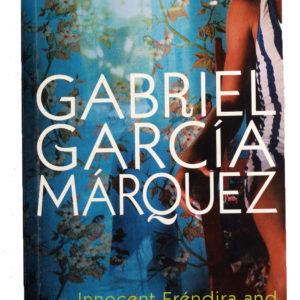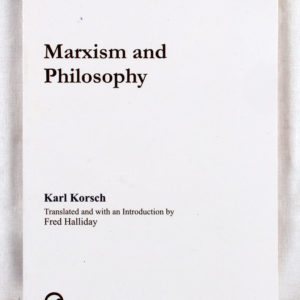Innocent Erendira and Other Stories | Gabriel García Márquez
₨ 478.40
This collection of fiction, representing some of García Márquez’s earlier work, includes eleven short stories and a novella, Innocent Eréndira, in which a young girl who dreams of freedom cannot escape the reach of her vicious and avaricious grandmother.
- Categories: Books, Fiction
- Tags: Gabriel García Márquez, Innocent Erendira and Other Stories, Leftshop, leftshopnepal, radical books, rare readings, red books
“The stories are rich and startling in their matter and confident in their manner….They are–the word cannot be avoided–magical.”–John Updike, The New Yorker
This collection of fiction, representing some of García Márquez’s earlier work, includes eleven short stories and a novella, Innocent Eréndira, in which a young girl who dreams of freedom cannot escape the reach of her vicious and avaricious grandmother.
“García Márquez’s fictional universe has the same staggeringly gratifying density and texture as Proust’s Faubourg Saint-Germain and Joyce’s Dublin….Arguably the best of the Latin Americans.”–Martin Kaplan, The New Republic
“It is the genius of the mature García Márquez that fatalism and possibility somehow coexist, that dreams redeem, that there is laughter even in death.’–John Leonard, New York Times
Related products
Fanshen: A Documentary of Revolution in a Chinese Village is a 1966 book by William H. Hinton that describes the land-reform campaign during the Chinese Civil War conducted from 1945 to 1948 by the Chinese Communist Party in “Long Bow Village” (the name used in the book for the village of Zhangzhuangcun in Shanxi province). Hinton lived in the village in spring and summer of 1948 and witnessed scenes described in the book and recreates earlier events based on local records and interviews with participants. He explains party strategy to present the campaign’s successes in building a revolutionary consciousness and a power-base among the poor peasants, but also its errors and excesses, especially the violence toward rich peasants and landlords. Fanshen has been compared to Edgar Snow’s Red Star Over China and characterized as “perhaps the book that most changed American cold war perceptions of the Chinese Revolution.”
Originally published: 1966
Author: William H. Hinton
‘To be sure, When Google Met WikiLeaks is a vital book, an admirably direct and clear-eyed attempt to make sense of the modern-day privacy and freedom of speech debates’—The Sunday Guardian
‘For those interested to know how present-day geopolitics, surveillance, censorship and publishing (if not foreign policy itself) are being shaped by the gods of the internet, this is recommended reading’—The Telegraph
‘In When Google Met Wikileaks, Assange makes a case for the dark net by suggesting that the open web site we all know best has sinister intentions’—The Independent
‘The most important accomplishment of the book may be the connection Assange establishes between the Google Politic and the ambitions set loose in Digital Age’—Prague Post
Purple Hibiscus is set in postcolonial Nigeria, a country beset by political instability and economic difficulties. The central character is Kambili Achike, aged fifteen for much of the period covered by the book, a member of a wealthy family dominated by her devoutly Catholic father, Eugene. Eugene is both a religious zealot and a violent figure in the Achike household, subjecting his wife Beatrice, Kambili herself, and her brother Jaja to beatings and psychological cruelty.
The story is told through Kambili’s eyes and is essentially about the disintegration of her family unit and her struggle to grow to maturity. A key period is the time Kambili and her brother spend at the house of her father’s sister, Ifeoma, and her three children. This household offers a marked contrast to what Kambili and Jaja are used to. It practices a completely different form of Catholicism, making for a happy, liberal place that encourages its members to speak their minds. In this nurturing environment, both Kambili and Jaja become more open and more able to voice their own opinions. While at Aunty Ifeoma’s, Kambili also falls in love with a young priest, Father Amadi, which awakens her sense of her own sexuality.
Purple Hibiscus is an exquisite novel about the emotional turmoil of adolescence, the powerful bonds of family, and the bright promise of freedom.
In Marxism and Philosophy Korsch argues for a reexamination of the relationship between Marxist theory and bourgeois philosophy, and insists on the centrality of the Hegelian dialectic and a commitment to revolutionary praxis. Although widely attacked in its time, Marxism and Philosophy has attained a place among the most important works of twentieth-century Marxist theory, and continues to merit critical reappraisal from scholars and activists today.
Publisher : Aakar Publications










Reviews
There are no reviews yet.